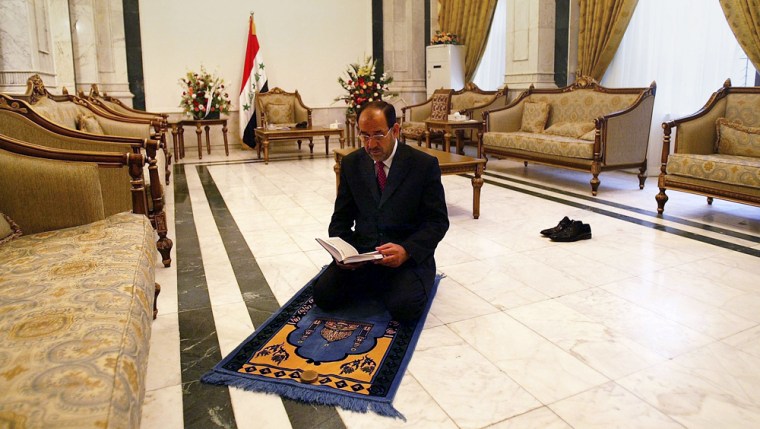President Bush on Saturday sought to repair tensions with Iraq’s prime minister and the White House asserted that Nouri al-Maliki is not “America’s man in Iraq” but a sovereign leader whom the U.S. is aiding.
Ten days before the Nov. 7 congressional elections in which the unpopular war in Iraq is a top issue, Bush and al-Maliki played down a feud over a U.S. plan for benchmarks for reducing violence. The dispute has thrown the White House on the defensive and undermined Bush’s attempt to put a new face on his much-criticized Iraq strategy.
For 50 minutes, Bush and al-Maliki talked by video conference to find common ground. Al-Maliki demanded the talk, according to a close aide, because U.S. Ambassador Zalmay Khalilzad was “no L. Paul Bremer” — the former administrator of the U.S.-led occupation — who could make decisions on his own. The White House issued a statement summarizing the talks.
The leaders said they were “committed to the partnership” and would work “in every way possible for a stable, democratic Iraq and for victory in the war on terror.”
“On the overall strategy for proceeding, the two countries are entirely aligned,” White House press secretary Tony Snow told reporters.
Bush and al-Maliki outlined three goals: speeding up the training of Iraq’s security forces; moving ahead with Iraqi control of its forces; and making the Iraqi government responsible for the country’s security.
A special group of high-level Iraqi ministers will work with the top U.S. commander in Iraq, Gen. George Casey, and Khalilzad to recommend how best to achieve those goals.
“As leaders of two great countries, we are committed to the security and prosperity of a democratic Iraq and the global fight against terrorism which affects all our citizens,” according to their joint statement.
During the video hookup, al-Maliki told Bush, “History will record that because of your efforts, Iraq is a free country,” according to Snow.
Al-Maliki was quoted by a close aide as having told Khalilzad on Friday, “I am a friend of the United States, but I am not America’s man in Iraq.”
'The sovereign leader of Iraq'
In response, Snow told reporters, “He’s not America’s man in Iraq. The United States is there in a role to assist him. He’s the prime minister — he’s the leader of the Iraqi people. He is, in fact, the sovereign leader of Iraq.”
Al-Maliki squabbled with the Bush administration this week over his objections to a timeline proposed by Washington for bringing security to Iraq.
“There are no strains in the relationship,” Snow said.
“In this prime minister, you have somebody in the Iraqi government who wants to take charge, who wants to take responsibility, is working on all fronts, on the economic side, on the security side, and on the political reconciliation side,” the spokesman said.
“And he believes it’s important to do whatever he can to build greater faith and trust with the Iraqi people in the democracy. So the president’s very happy actually with the way the prime minister is working.”
Strong ties, Snow says
In the video hookup, Al-Maliki portrayed the U.S.-Iraqi relationship as strong and growing stronger, according to Snow, and said there are many signs of success in Iraq. Most of the conversation focused on security strategy, with the prime minister pressing for more control over Iraqi forces and greater ability to respond quickly to problems, the spokesman said.
Bush “expressed not only his confidence but happiness that you’ve got a prime minister who’s being very assertive about building greater Iraqi capability and also engaging in the necessary business of using force when necessary to go after the people who are going wrong,” Snow said.
Snow said it was important that prime minister said “the door is now open to anybody who wants to join in the reconciliation of political process.”
“He is inviting people to sort of lay down arms and get with the political process, but on the other hand he is resolute ... in his determination not to accept the activities of people who want to commit acts of violence to destabilize the government or to jeopardize democracy,” Snow said.
“He’s making tough decisions, and he’s showing toughness and he’s also showing political skill in dealing with varying factions within his own country. And both leaders understand the political pressures going on,” Snow said.
The death of a Marine in Anbar province west of Baghdad on Friday brought to 98 the number of American forces killed in Iraq in October — already the fourth deadliest month since the Iraq war began in March 2003. Overall, U.S. deaths have topped 2,800 as the war drags into its 44th month.
